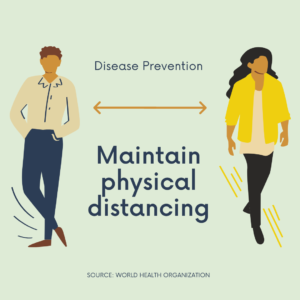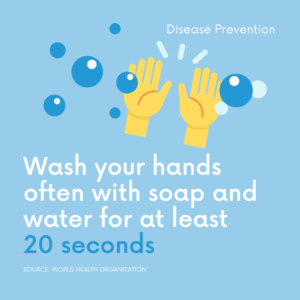COVID -19 and surrogate health are interrelated. Staying safe and healthy is key to better surrogacy experience in this time of crisis.
The word corona is derived from the Latin word ‘corona’ meaning the crown. Rarely can animal coronaviruses infect individuals and then spread among people like MERS-CoV, SARS-CoV, and now with this new virus (named SARS-CoV-2). The SARS-CoV-2 virus, like the SARS-CoV and MERS-CoV, is a beta coronavirus. It has now been declared as a pandemic by WHO. All nations are trying their best to halt and remove this epidemic. They have imposed tourism bans all around the world. COVID-19 and surrogate health are important issues as of now for all intended parents.
The COVID-19 virus has different ways of affecting different people. COVID-19 is a respiratory disease and most infected patients may moderate symptoms and recover without special treatment being needed. Individuals above the age of 60 years and chronic medical condition are at elevated medical risks by this serious illness and can even report death like situation.
Popular symptoms include:
- Fever
- Dry cough
- Tiredness.
Other symptoms include:
- Shortness of breath aches
- Nausea or runny nose
- very few people report diarrhea
- Sore and painful throat
 The COVID -19 and Surrogate health
The COVID -19 and Surrogate health
Coronavirus has created a lot of ruckus in the surrogacy industry. This ruckus is not because of the disease but because of the lack of information about the COVID -19 and the surrogate’s health.
Since it is a new virus, there is not much information about the effect of the virus on the surrogate’s health or any pregnant ladies’ health.
However, few questions are answered about the COVID -19 and pregnancy of the surrogate mother. So, here comes, the 5 basic questions about the COVID -19 and surrogate’s health –
#1. Are pregnant surrogate mothers at risk of contracting the COVID -19?
Pregnancy makes you at risk for many diseases, not just the COVID -19. Pregnant women experience immunological and physiological changes that could make them more susceptible to viral respiratory infections, including COVID-19, according to the CDC.
It is not that their immune system is weak. Although what happens to their bodies during pregnancy, makes them more vulnerable. During pregnancy, a woman’s respiratory and immune systems adjust. Such modifications make them a part of the high-risk the COVID -19 population, just as they are for influenza and pneumonia.
So, they should take special care of themselves. They should practice social distancing, wash their hands frequently and stay 1 meter away from the person experiencing the cold and flu-like symptoms.
#2. Can a pregnant surrogate mother pass on the COVID -19 infection to their fetus or newborn?
It is unlikely that a woman will pass the COVID -19 infection to their fetus. The COVID -19 infection spreads through the respiratory droplets, either through cough and sneezes according to CDC.
It remains unclear whether a pregnant woman with COVID-19 will transmit the virus that causes COVID-19 to her fetus via other routes of vertical transmission. Moreover, the virus is not detected in the samples of the breastmilk and amniotic fluid. So, a woman may not pass it to the fetus.
But a newborn can surely get affected if someone with the COVID – 19, touches or sneezes or coughs near the baby. So, special care has to be taken of the baby so that the baby does not get the COVID – 19 infections.
#3. Should a pregnant surrogate make a journey to the intended parents?
It is a personal decision to account for. Nobody has yet said that you cannot travel in the pregnancy but there are factors that you need to keep in mind before planning a journey or travel plans to the intended parents –
- How far have you reached in pregnancy? – If you are in the last trimester then it is advisable not to travel alone in the pregnancy.
- What are your backup plans?
- Consider the ground situations – Since, the COVID -19 has infected more than 190 countries around the world, it is not safe to travel to these countries. Some of them have also imposed a travel ban.
- Will you have access to medical care at the place you are visiting?
One should look into all these matters in-depth and then only plan to visit the intended parents.
#4. Does being infected with the COVID -19 put the surrogate’s pregnancy at risk?
Yes, but it is not the virus that will put the pregnancy at risk. It is the symptoms. Among cases of infection with other associated coronaviruses during pregnancy, pregnancy loss including miscarriage and stillbirth has been observed, according to the CDC.
High fevers may increase the risk of some birth defects during the first trimester of pregnancy. In the first trimester, studies of pregnant women with SARS, 4 out of 8 pregnancies ended in miscarriage.
There isn’t enough detail to say whether the virus, the nature of the mother’s disease, or other causes caused the miscarriages. Further work is needed to learn how infection with coronavirus will affect a pregnancy. So, if you are infected with the COVID -19 and is a pregnant woman, consult your healthcare provider as soon as possible. They are the only ones who will help you out.
#5. Are infants born to the surrogate mothers with the COVID -19 infection show adverse outcomes?
The implications for babies born to women with Coronavirus are too premature to be understood. According to a study of nine pregnant women and their babies reported last month in The Lancet, the infants born to women with a Coronavirus infection seemed virus-free and appeared stable at birth.
The CDC does say otherwise, however. Adverse infant outcomes like preterm birth were identified among infants born to COVID-19-positive mothers during pregnancy, based on restricted case reports.
However, it is not clear that these results were related to maternal infection. Knowledge of adverse outcomes from other respiratory viral infections may provide some details despite the limited data available about COVID-19 during pregnancy. For example, during pregnancy, other respiratory viral infections were associated with adverse neonatal outcomes, including premature birth and low birth weight. Additionally, early in pregnancy, having a cold or influenza with high fever may increase the risk of certain birth defects.
 Conclusion
Conclusion
Therefore, a pregnant surrogate needs to take care of herself so that the disease does not pass to the baby. The bottom line is staying home for social distancing, eating healthy, moderate exercise, and a positive attitude mentally and emotionally is needed at this time of crisis.
If you’d like to learn more about IVF, Egg Donation or surrogacy services globally, check out the rest of our website at IVF Conceptions. We offer legally secure and affordable surrogacy consulting services for FREE.


 The COVID -19 and Surrogate health
The COVID -19 and Surrogate health Conclusion
Conclusion